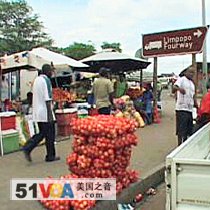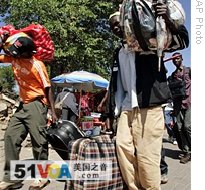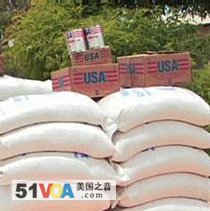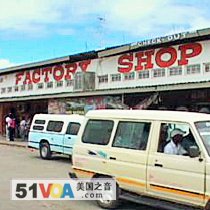Beitbridge Border Post, South Africa
25 February 2009
The Zimbabwean economy is reeling under an economic disaster characterized by hyper-inflation, 80 percent unemployment and shortages of food, fuel and other basic goods. But despite the virtual collapse of the formal economy, business is booming in certain areas.
 |
| Bags of fruit, ready to be driven across the border into Zimbabwe |
In Zimbabwe, the shelves in most stores are empty. There are shortages of food, fuel and other basic goods. And few people have money to buy what is available.
Yet millions of dollars worth of goods cross the border from South Africa each week. The South African government, according to official statistics, last year supplied one-half of Zimbabwe's imports, some $2 billion worth.
But it is the unofficial trade born of necessity that is most noticeable here.
 |
| Zimbabweans walk towards the Beitbridge Border Post after shopping in Musina, South Africa (2008 photo) |
Zimbabweans, some of whom have crossed the border just for the day, are their primary customers. Some come to South Africa to shop just for their families. Each individual is allowed $100 worth of goods duty-free.
Others can be seen lugging heavy jute-sack bags through the border post or driving up with trucks loaded down with goods. For these people, it is a living.
Webster Chibobo is lounging with a dozen other traders in the shade at a mini-bus stand a few meters from the border post.
 |
| Webster Chibobo runs a trading business with goods from South Africa |
Chibobo has been doing a thriving business buying goods in South Africa and selling them at home. But he says everyone in Zimbabwe now is trading in foreign currency, or forex, because the inflation-battered Zimbabwean dollar is worthless.
"The economy has just gone down," said Chibobo. "That's why we are now using forex [foreign exchange] because the Zim dollar, we can't even use. You can't pay anything with it usually."
 |
| Most Zimbabweans, especially in rural areas, are dependent upon donated food |
In Musina, a South African town 12 kilometers from the border, the streets are filled with stores catering to Zimbabwean traders.
The Messina (sic) Factory Shop is a large warehouse sitting off the main street. Inside, shelves reaching to the ceiling are piled with crates of maize meal, canned goods and paper products.
Manager Imtiaz Seedat smiles as shoppers fill carts with goods. He says his clients range from small buyers to wholesale traders. Business is booming.
 |
| The Factory Shop does a substantial business with individuals and traders buying in Musina and taking goods back across the border to Zimbabwe |
Zimbabwe's formal economy has basically collapsed and there is widespread hunger in the country. Many hospitals and schools are closed. And public water and sanitation services have deteriorated, leading to a cholera epidemic that has killed 3,800 people.
But Seedat says this can be misleading.
"There's a lot of money in Zimbabwe," he said. "I don't understand it when people say there is no money in Zimbabwe. There is money. But the banks haven't got money. The people's got the money."
He notes that the Zimbabwean government recently began allowing businesses to trade in foreign currency. As a result, some big outlets in Zimbabwe are now stocking their shelves. The competition has brought prices lower and his business has slowed somewhat.
Outside the store, people load crates of goods onto cars, trucks and trailers, most with Zimbabwe registration plates. When the vehicle is full or they have run out of money, they begin the long ride home.
Zimbabweans hope the new power sharing government which was inaugurated this month will revive the economy, but most Zimbabweans believe the task will be long and difficult.
In the meantime, the cross-border trade continues to thrive in spite of the crisis, or rather because of it.